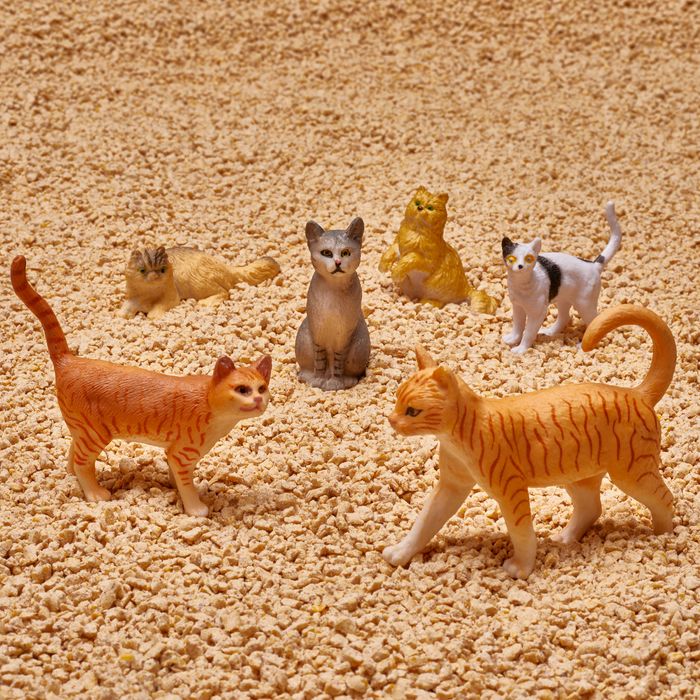
In my decade of owning a cat, I’ve learned that some cat litter stinks up your whole apartment, some erupts in a cloud of dust whenever you scoop, and others get caught in your cat’s paws and track all over the floor. It doesn’t help that cats are famously finicky and one cat’s favorite litter could be totally off-putting to another. As Jessica Herman, a veterinarian with AskVet, says, “It can take trial by error to figure out what type of litter your feline friend will enjoy.” There are tons of options out there, each promising unique benefits for you and your cat, from easy cleanup and odor control to minimized dust and superior materials.
To cut through the marketing claims, we asked 14 experts — including veterinarians, animal-shelter workers, and cat behavioralists who’ve worked with hundreds of felines over the years — what litter they recommend and which ones they actually use with their own pets. Ahead, you’ll find nine cat litters (plus a litter-box system and a deodorizer) recommended by our panel of experts that should satisfy even the pickiest of feline friends. Or you can jump to whatever type of cat litter you’re looking for below.
Most popular cat litters are made from liquid-absorbing materials that clump around waste. Some clumping litters are even flushable. For the majority of cats, all of our experts agree that clumping litter is most convenient. “It allows for easy removal of urine and feces and you don’t have to dump the whole box of litter — just scoop up the part that’s soiled and then replace as needed,” says Carly Fox, a senior veterinarian at Animal Medical Center. She adds that studies have shown cats tend to prefer clumping litter when offered multiple options. There are some instances when you will want a non-clumping litter, though, like if your cat recently had surgery, as clumping litter can stick to incisions.
It’s tempting to choose a cat litter that promises to mask smells, but veterinarians advise against litter with added fragrance. Laura Pletz, a veterinarian and the media director at BluePearl Pet Hospital, says these scents can deter cats from using the litter box. As an alternative to fragrances, look for ingredients like charcoal and baking soda that absorb odor instead of covering it up. Your best defense against odor, though, is actually frequent scooping. “No one really enjoys using porta-potties, and if the litter box is not cleaned regularly, that is how it smells to a cat,” explains Cathy Bosley, a certified feline training-and-behavior specialist and administrative assistant at the Best Friends Animal Society Sanctuary’s Cat World.
Some clay cat litters can create a lot of dust, which can be irritating to both cats and humans. If you’re very sensitive to dust (or have a small bathroom where it’s hard to dissipate), consider alternative materials like crystal or grain.
Traditionally, cat litter has been made from clay (specifically sodium bentonite), and it remains one of the most popular materials because of its ability to absorb moisture and clump around waste. The downside of clay is that it’s not flushable, so some brands have switched to alternatives like wheat, corn, and even silica crystals that also clump but can be tossed down the toilet. Clay also takes much longer to biodegrade than wheat or corn, so one of these options may be better if you’re looking for an ecofriendly litter.
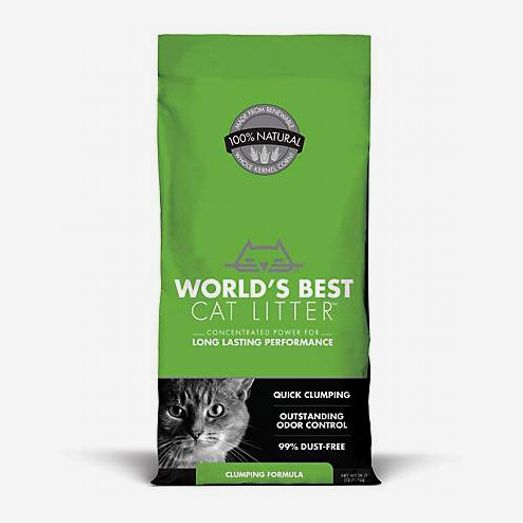
Clump or no clump: Clumping | How it smells: Unscented | Dust levels: Low dust | Ingredients: Corn
For a litter that checks all the boxes and should work for most cat-owning households, Bosley and Kerrie McKeon, resident cat expert at the animal-welfare and adoption organization Bideawee, recommend World’s Best. “It’s clumping, it’s natural, and I have asthma and allergies and it doesn’t set anything off for me,” says McKeon. “If you scoop it morning and night, a bag gets you through quite a while.” Made from corn kernels, it’s a natural option that’s also septic-safe, so you can easily flush away both liquid and solid waste. Bosley adds that out of all the litters her shelter has tried, this one “cuts down on the odors best.”
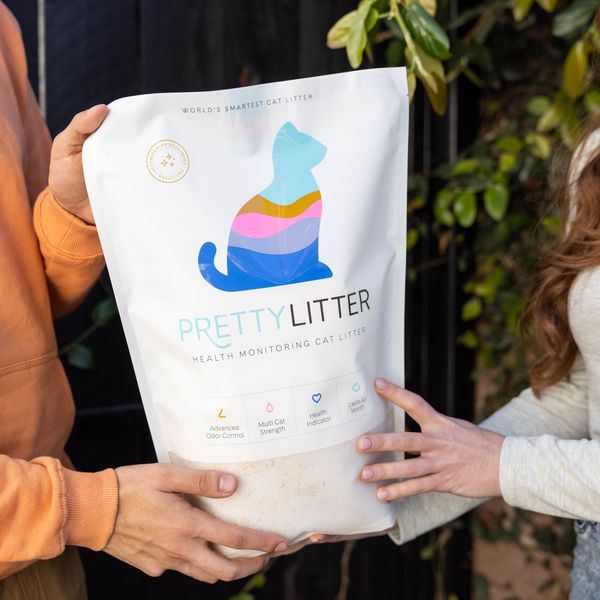

Clump or no clump: Non-clumping | How it smells: Unscented | Dust levels: Low-dust | Ingredients: Silica gel crystals
Because it’s made from gel crystals, PrettyLitter actually absorbs liquids instead of clumping around them. This means you only have to scoop solid waste, which you can easily flush away. This is the litter I use at home after trial and error with lots of other options. In my experience, it’s the least smelly and doesn’t generate much dust. Compared to clay and other litter materials, the crystals don’t stick to my cat’s paws nearly as easily, so it doesn’t track around the house. The crystals also help monitor your cat’s health, as they change color in reaction to different chemicals in urine that may indicate bladder or kidney disease. Strategist writer Tembe Denton-Hurst has been using PrettyLitter for the past year with her two cats and says she appreciates the peace of mind this feature provides between vet visits. “Cats are really adept at hiding sickness until they’re literally at death’s door, so it makes me feel a little better,” she says.
The brand is part of a new generation of so-called “smart” litters, according to Rebecca Greenstein, the veterinary medical adviser for pet-sitter site Rover, because of its ability to help you track your cat’s health. But Greenstein also mentions that “while these new-wave litter options are definitely a step in the right direction for conscientious cat owners, they’re best used as a screening tool.” Dr. Gabrielle Fadl, a medical director at Bond Vet, even warns that relying too heavily on health-monitoring cat litter like PrettyLitter can lead to unnecessary visits to the vet. “A better indication of your cat’s urinary health is your own eyes and monitoring their behavior,” she says, citing more frequent usage of the litter box and higher water intake as more reliable health cues.
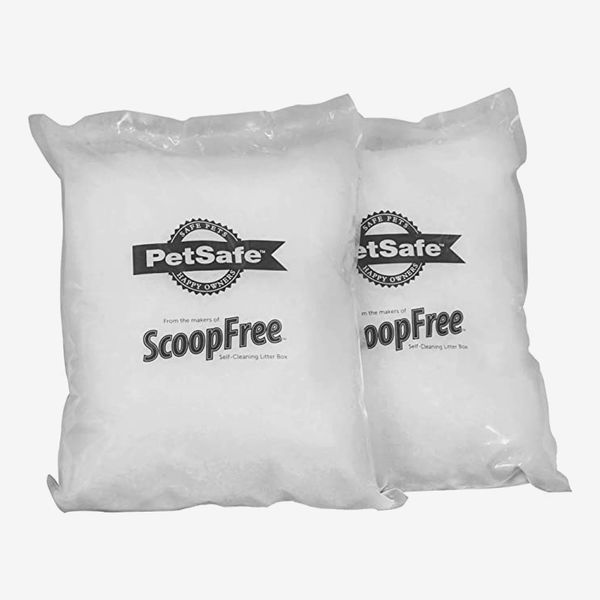
Clump or no clump: Non-clumping | How it smells: Unscented | Dust levels: Low dust | Ingredients: Silica gel crystals
Dr. Maddie Buddendorf, an associate veterinarian at URvet Care, says her long work hours used to lead to irregular litter-box cleanings for her two domestic short-haired cats. To combat this, she began using this PetSafe litter in conjunction with the brand’s self-cleaning litter box. While the system works to rake away waste multiple times a day, Buddendorf says the litter itself gets high marks for odor control, plus it’s ultra-long-lasting, usable for up to 30 days, and can be used in any standard litter pan. “Because it’s a silica-gel-based litter, it absorbs liquid and odors almost instantly,” Buddendorf says, adding that “it dries out feces, which makes scooping a breeze.” The non-clumping crystals are larger than the fine granules found in most clay litters, so there’s also less tracking throughout Buddendorf’s house, and it’s easier to vacuum. Although the one shown doesn’t contain fragrance, PetSafe litter is available in fresh and light lavender scents.
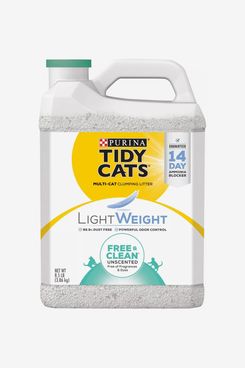
Clump or no clump: Clumping | How it smells: Unscented, with odor-absorbing charcoal | Dust levels: Low dust | Ingredients: Clay
This litter is about $2 less per pound than the option above but differs from PetSafe in that it’s clay-based and contains activated charcoal to naturally absorb odors. With three litter boxes at home, Angie Krause, a holistic veterinarian and consultant for I and Love and You pet food, really likes that this litter provides excellent odor control and is lightweight and easy to carry. While her cats — one in renal failure and another with irritable bowel disease — use the litter box more than most, she says this litter is just as good for owners of healthier cats who simply don’t want to lug around heavy bags of litter. This also offers “the best odor control” of a lightweight litter, according to Krause. Veterinarian Elizabeth Bales reaches for the brand at her local shops, and Bosley is another fan of Tidy Cats litter because it’s unscented and won’t bother cats with allergies.
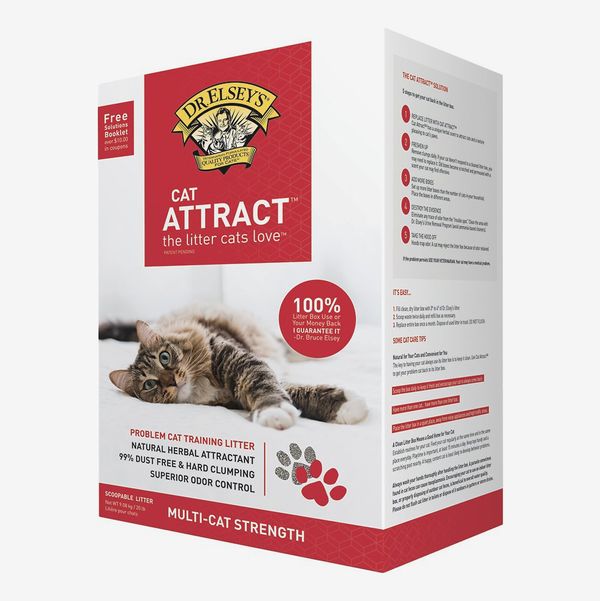
Clump or no clump: Clumping | How it smells: Lightly scented with cat-attracting herbs | Dust levels: Low dust | Ingredients: Clay
For a cat who isn’t using the litter box — or is learning to use one as an adult — this litter contains a proprietary blend of herbs that, much like catnip, lures felines in. McKeon promises, “I’ve actually seen it in action and it does work.” When her shelter rescued a large group of cats that had never used litter boxes before, she says they put Cat Attract in all of their boxes, and “no one ended up needing meds to use a litter box; they all eventually learned how to use it.” Krause agrees this litter can be a huge help for cats with behavioral issues, but she does advise to check with your vet before purchasing to ensure your cat isn’t avoiding the box due to illness.
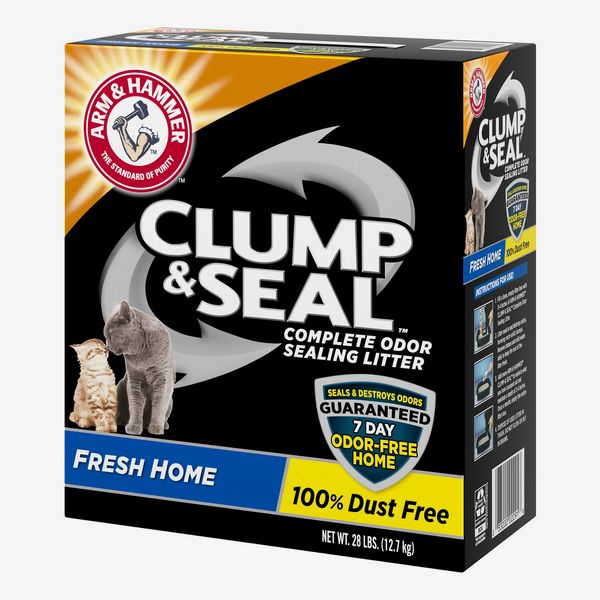
Clump or no clump: Clumping | How it smells: Lightly scented with odor-absorbing baking soda| Dust levels: Low dust | Ingredients: Clay
Just like humans, some kitties are asthmatic and therefore sensitive to dust. For these cats, experts recommend looking for a low- or no-dust litter. “Imagine trying to use the bathroom in a dust storm,” says Bosley. “Not fun.” Litter that produces a lot of dust when cats dig in it and kick it up can also be unpleasant for humans, too. Bosley says Arm & Hammer’s Clump & Seal litter is as close as it gets to being totally dust-free. Plus, it’s great for managing odor, she says, thanks to the addition of baking soda.
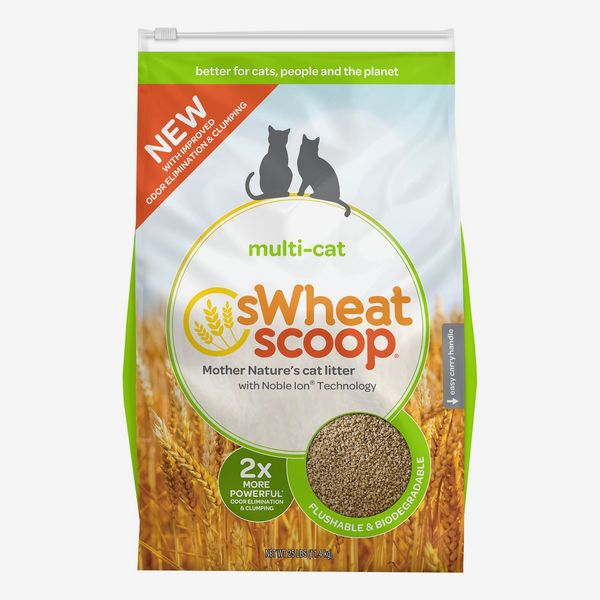
Clump or no clump: Clumping | How it smells: Unscented | Dust levels: Low dust | Ingredients: Wheat
Compared to traditional clay litter, those made from alternative materials like corn, wheat, and grains are more environmentally friendly and easily biodegradable. This one is made from farm-grown wheat and comes recommended by Bosley, especially for cats who are sensitive to scents or dust. Strategist senior editor Jen Trolio also prefers this natural litter so much that she has been using it for over ten years with her two cats (they are now 15 years old). She appreciates that the brand is plant based and doesn’t contain hazardous chemicals like crystalline silica and sodium bentonite, which can be harmful if a cat has a habit of eating litter. “The clumping is not as strong as with clay litter, but it very much gets the job done,” she says. If you plan to keep backstock of natural litter in a basement or crawl space, Trolio suggests storing it securely (she uses a plastic Rubbermaid tote) to prevent critters from nesting inside open bags.
In a previous version of this story, Heike Klassmann, an adoption-seminar leader with Anjellicle Cats, recommended Weruva’s Classic Fresh Scented Clumping Wood Cat Litter, which blends naturally odor-controlling hinoki (cypress) wood and green tea. Like the sWheat option above, it’s flushable and doesn’t contain sodium bentonite.
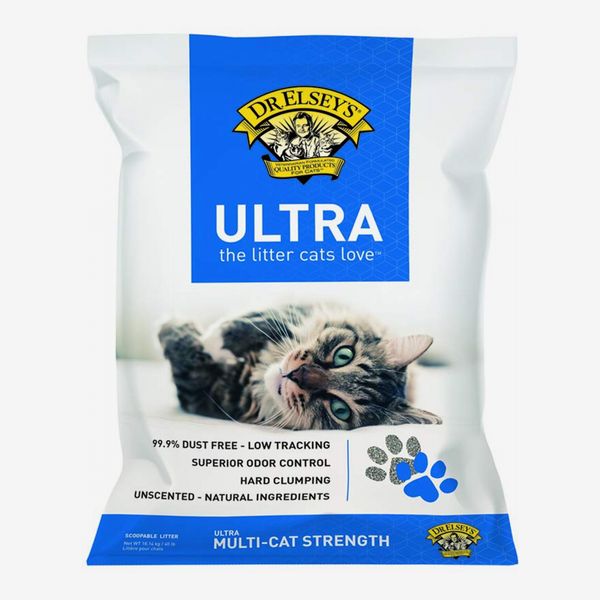
Clump or no clump: Clumping | How it smells: Unscented | Dust levels: Low dust | Ingredients: Clay
Both Stray Cat Social Club founder Scott Bleicher and Zay Satchu, co-founder and chief veterinary officer at Bond Vet, recommend this litter for multi-cat households. “If you have more than one cat in the house, you should consider multiple boxes. Ideally, pet owners should have one box for every cat plus one,” explains Satchu. Bleicher says he can live with up to ten cats at a time (both his own and fosters) — and knows full well that more cats means more litter maintenance and more potential headaches. Like most experts, he prefers clumping litter because it’s “the easiest to scoop and the best at containing odors,” and particularly likes this “multi-cat strength” formula. He notes that it “contains one ingredient — natural clay — [and] no added dyes, perfumes, or chemicals,” making it more likely to work for a group of cats with different needs and preferences.
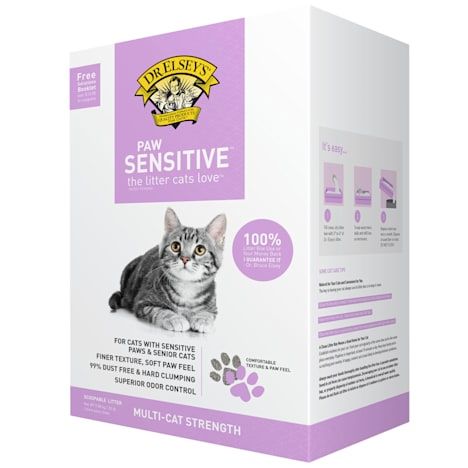
Clump or no clump: Clumping | How it smells: Unscented | Dust levels: Low dust | Ingredients: Clay
Tazz Latifi, a certified pet nutritionist and retail consultant, recommends the paw-sensitive litter from Dr. Elsey’s for senior cats. It has finer granules than the other options on this list, giving it a sandlike consistency, which Latifi says is beneficial for elderly cats, especially those experiencing age-related health conditions or reduced activity. “It may be stressful for them to step into the litter box, and depending on the type of litter, it may be irritating to their paws because of sensitivity as they get older,” she says. In addition to paw soreness, joint inflammation can also cause senior cats to feel uncomfortable while standing on denser litters like pellets. Latifi says this gentle option has all the advantages of a clay litter, like fast clumping and minimal dust, but can help prevent unwanted house-soiling.
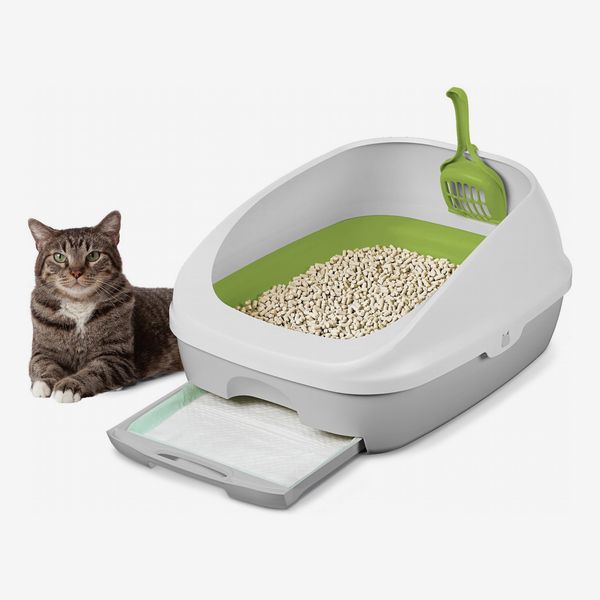
Clump or no clump: Non-clumping | How it smells: Unscented | Dust levels: Dust-free | Ingredients: Zeolite pellets
Dr. Fadl owns two cats, one of which has cerebellar hypoplasia, which impacts movement and mobility. Because of her cat’s condition, Fadl uses the Breeze litter-box system to eliminate dust and unwanted tracking around her home, which also makes it “a great option for cats that have respiratory issues like asthma,” she says. And unlike the other litters on this list, this one uses pellets to separate solid excrement from urine, which trickles through a grated tray to an absorbent litter pad that’s locked away in a drawer below for easier cleanup. She recommends changing the pellets at least once a month but says they can be washed and reused, so you’re not purchasing new litter as often as a traditional box system.
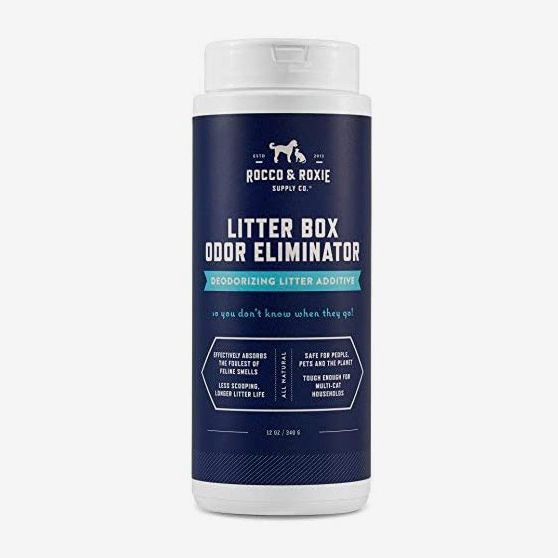

This isn’t technically a litter, but since contributor Julia Gomez Kramer raved about this odor eliminator, we felt the need to include it for the cat owners who don’t want their homes to smell like their cats. Kramer, who has two cats named Tuna and Salmon, had tried odor-absorbing balls, deodorizing powders, and even charcoal filters before. But this deodorizer was the winner: “When I use it, the litter box smells more like nothing than anything,” she says.
• Elizabeth Bales, veterinarian
• Scott Bleicher, founder of Stray Cat Social Club
• Cathy Bosley, certified feline training-and-behavior specialist and administrative assistant at the Best Friends Animal Society Sanctuary’s Cat World
• Maddie Buddendorf, associate veterinarian at URvet Care
• Tembe Denton-Hurst, Strategist writer
• Gabrielle Fadl, medical director at Bond Vet
• Carly Fox, senior veterinarian at Animal Medical Center
• Rebecca Greenstein, veterinarian and medical adviser at Rover
• Jessica Herman, veterinarian with AskVet
• Heike Klassman, adoption-seminar leader with Anjellicle Cats Rescue
• Angie Krause, veterinarian and consultant for I and Love and You
• Tazz Latifi, certified pet nutritionist and retail consultant
• Kerrie McKeon, resident cat expert at Bideawee
• Laura Pletz, veterinarian and media director at BluePearl Pet Hospital
• Jen Trolio, Strategist senior editor
The Strategist is designed to surface the most useful, expert recommendations for things to buy across the vast e-commerce landscape. Some of our latest conquests include the best acne treatments, rolling luggage, pillows for side sleepers, natural anxiety remedies, and bath towels. We update links when possible, but note that deals can expire and all prices are subject to change.
